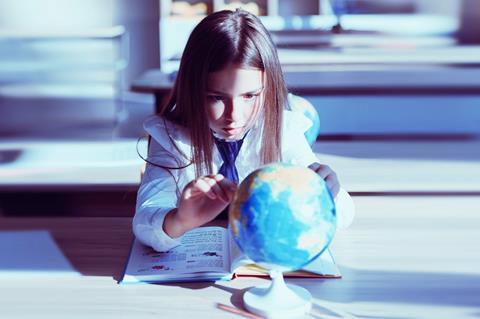Kate Orson has some top tips for helping you talk about climate change with your children while keeping God front and centre of the debate

As ’Earth Day’ is marked on April 22nd, more and more children are experiencing ‘eco-anxiety,’ and even being given medication to counter its ill-effects. The condition is defined by The American Psychological Society as a ‘chronic fear of environmental doom.’
In society, well-intentioned teachers and caregivers, and messages in the culture about ‘saving the world’ may contribute to a child’s sense of taking the heavy burden of environmental destruction on their own shoulders. Is it the next generation’s responsibility to save the world? It’s clear from the book of Revelation that one day Jesus will return and God will create a new heaven and a new earth. Does this mean that we just tell our children not to worry, sit back and wait for Jesus to come back?!
I spoke to Deborah Tomkins, co-chair from Green Christian, an organisation who see caring for God’s creation as one of the central roles of Christians. Tomkins explains, ‘’That was the first job that Adam was given. If you go back and look at Genesis chapters 1 and 2 we see him looking after the garden.’’
Tomkins points out that humans were created on the same day as the animals. ‘’we were all created in the middle of that wonderful burst of creation. I’m not saying this is scientifically accurate, we aren’t all necessarily created in one day, but the theology behind it is that we are a web of interconnecting creatures that need each other. ‘’
Tomkins shares that until around the 16th and 17th century it was understood that being a Christian meant respecting God’s creation and taking care of it. Now she has observed it’s a very common response to abdicate responsibility for the state of the planet.
‘’It’s quite disturbing because clearly there’s an awful lot going wrong. We don’t know when Jesus is coming back. It could be next week, or next year, it could be in a thousand years. In the meantime it’s our job to look after the planet.’’
While it’s clear we need to respect the earth as much as we can, rising levels of eco-anxiety show just what a heavy burden it is becoming on children. Tomkins warns about being careful in how we communicate with them.
”Children are very tender plants. You wouldn’t put a tender plant in a snowstorm and expect it to survive. You look after it in the greenhouse first, wait for the weather to get warmer, and then you put it out. We know that children’s psyches and development can be affected if they are unduly stressed.’’ With that in mind, we want to be careful to strike a balance between informing children, and not overwhelming them with too much. Here are a few tips;
Helping children to process emotions
It’s completely natural to feel overwhelmed and upset about the state of the earth. In Green Christians courses Tomkins helps people to ‘’express their fear, grief, their frustration with the powers that be, their confusion. These are difficult emotions, but I don’t call them negative because emotions are there for a reason. Don’t try and squash them down because they’ll come out in some other way.’’
Taking Action
When working with children and parents I’ve noticed that after expressing emotions, there is mental space to come up with solutions to problems. Maybe it’s something on a small scale, like buying second hand clothes instead of new items, or volunteering at a local community garden. These small acts can be empowering and help children feel like they are doing something. It could be something an adult suggests, or a child might even come up with an idea themselves. Tomkins says, ”we are made in the image of God. So we have God’s attributes, of wisdom, compassion, love, justice and mercy. We might not always be good at acting according to these attributes, but we are God’s partners, and we can work in partnership with him.’’
Partnership is key, as when we stay close to God, through prayer and reading his Word, we can take on the tasks that he guides us towards, rather than feeling like we have to do it all alone. We can remind children of this too.
Manage Exposure
We might want to consider what we expose children to. Research has found that regularly consuming news makes us more depressed and so it’s possible that regular messages about the earth’s destruction could contribute to eco-anxiety. Strike a balance between informing and overwhelming, and if a child is sensitive definitely be extra careful. A children’s TV programme or magazine about wildlife can be a way to appreciate God’s creation but it might also include alarming messages about the state of the earth.
When we want to talk about environmental issues, we can consider how to make the info child friendly. I was shocked when one of my daughter’s textbooks warned that ”one day there will be a war over water.” Tomkins recommends a more helpful way to instill the message about water conservation. ‘’When we talked about turning off taps, it’s about not wanting to have water rationing later on in the summer because we don’t have enough water in our reservoirs.’’
Enjoy
It’s very hard to be depressed about the state of the world when out in nature. We can spend time with our children enjoying God’s creation. Talk about what you see and reflect on the wonder of it all. For example, isn’t it amazing how God made these flowers, not just for the bright colours to attract bees but for humans to enjoy too? Isn’t the sound of birdsong beautiful, and yet it’s also a way that birds attract a mate?
Tomkins says, ‘’When our children were young we’d go for walks and see what’s under a stone and it might be a centipede or a woodlouse or something,. We went to look at fossils and things like that. Children could have a patch of the garden to grow their own herbs or tomatoes and then eat them with great celebration.’’
Focusing on the small scale rather than taking on the weight of the world is crucial to ease anxiety. However, there may still be times when the weight of the world starts to pile up on your shoulders, or your children’s. When it all seems too much we can remind them of what Jesus said in Matthew 11, ‘Come to me, all you who are weary and burdened, and I will give you rest.’ (Matthew 11 28-30). While the world tells us the burden is ours, we can remind our children that they have Jesus.































